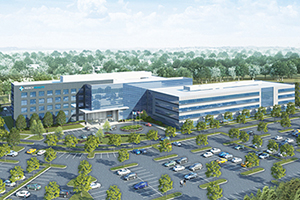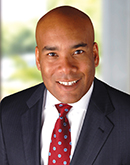BY KATHLEEN NELSON
System building headquarters in an economically marginalized area, spurring development
Mercy Health is digging deep to strengthen its roots and solidify its commitment to the urban core in its hometown of Cincinnati.
The system has started construction on its new headquarters in a community that is ripe for revitalization and it has lent its sponsorship support to an outdoor fitness facility in an adjacent neighborhood. "We spend a lot of money in health care," said Calvin T. Wright, senior vice president and chief resource officer for Mercy Health, who added that the goal with these projects is to "direct some of that to our neighborhoods that are suffering and open up opportunities for them."

This rendering shows the headquarters of Mercy Health, being built in the Bond Hill neighborhood of Cincinnati. It is scheduled to open in spring 2016.
Wright led the site selection committee for the new headquarters that chose Bond Hill, "an area that had seen better days," he said. "A lot of older residents have stayed, but businesses have moved out."
Core strengthening
The headquarters are scheduled to open next spring on land once home to a cinema complex. Mercy Health's pair of office buildings will comprise 365,000 square feet and employ more than 1,000 people. Mercy Health, formerly Catholic Health Partners, is the largest health system in Ohio. It operates 27 hospitals in Ohio and Kentucky.
Mercy Health has committed to using local vendors and to hiring minorities and women for 20 percent of the construction workforce. Its other notable investments in Northeast Cincinnati include supporting new wellness initiatives and signing on as presenting sponsor of The Greater Cincinnati Outdoor Fitness Gym, which opens next month at the Cincinnati Reds Urban Youth Academy in the Roselawn neighborhood. The outdoor gym is a major part of Cincinnati's Roselawn Neighborhood Improvement Program and it ties into Mercy Health's goal of improving community health.

Wright
"We felt like this was a good opportunity for us to make an impact in the urban core of Cincinnati," Wright said, adding that since Mercy Health broke ground on its headquarters, plans have been announced for a 40-bed rehab hospital across the street from Mercy's headquarters and a large urology group has moved its headquarters into the area.
Census data from 2010 shows that of Bond Hill's 7,000 residents, more than 90 percent were African American and that the median family income was $34,000. Approximately 85 percent of Roselawn's 6,400 residents were African American, and the median family income was $28,000. Wright grew up in a similar neighborhood in Memphis, so his connection to Mercy's mission to redevelopment runs deeper than a job description.
"I see how these neighborhoods are deteriorating and that there's not a lot of hope," he said. "We are in a position that we can influence economic activity and try to help some of the folks in these urban communities have better opportunities. It's a passion of mine, and I'm blessed to be in a position to influence purchasing."
Job security crusade
As Mercy's head of purchasing, Wright saw another opportunity to commit to the neighborhood when he learned that Chester Labs, a plant in Roselawn that produces water-based soaps, lotions, personal-care items and ultrasound gel, was in danger of being shut down. Chester Labs, which employs about 100 people, most of whom live in the neighborhood, was purchased seven years ago by Medline Industries, a major supplier to Mercy and other health systems.
Seeing the loss of the plant as "devastating," to the neighborhood's employment base, Wright reached out to Medline. The supplier said it needed purchasing commitments larger than Mercy Health could provide to keep Chester Labs in business, so Wright turned to his peers at other ministry health systems.
Wright secured commitments to evaluate the plant's products from Bon Secours Health System in Marriottsville, Md., SSM Health in St. Louis, PeaceHealth in Vancouver, Wash., and Presence Health in Chicago. Despite everyone's effort the plant is closing, but Medline has decided to repurpose the facility, saving jobs in the process, Wright said.
Copyright © 2015 by the Catholic Health Association
of the United States
For reprint permission, contact Betty Crosby or call (314) 253-3477.